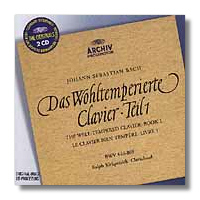
The Internet's Premier Classical Music Source
Related Links
Recommended Links
Site News
Johann Sebastian Bach
Performances of "Well-Tempered Clavier"
Book I from Ralph Kirkpatrick
Archiv/Deutsche Grammophon recently re-issued Ralph Kirkpatrick's performances of Bach's Well-Tempered Clavier Book I which were recorded in 1959 on the clavichord; the catalog number is 463601. I'm not going to go through every prelude & fugue, but I will write about those which I feel are either not competitive or are exceptional:
Fugue in C Major – Momentum and inevitability are the key aspects I look for in performances of this fugue, and Kirkpatrick is outstanding in providing these two features.
Prelude in C minor – Kirkpatrick plays the prelude with excitement and also gives it a sinister quality which I like very much; his ending is sharp and well detailed.
Fugue in C minor – Momentum is strong here as in the C Major Fugue. Also, Kirkpatrick's lyricism is irresistible.
Prelude in C sharp minor – Very sad and reflective music superbly performed by Kirkpatrick. The tangy quality of the clavichord, as in Colin Tilney's performance on Hyperion, is a great match for the prelude. Kirkpatrick's phrasing and sharp accenting are very impressive.
Prelude in E flat minor – Kirkpatrick's performance is slow and luxuriating, very similar to Colin Tilney's wonderfully incisive reading. Both are great listening experiences.
Prelude in E Major – Kirkpatrick is exceptional with all the comfort I could ask for; when tension is needed, he rises to meet the need.
Prelude in E minor – This prelude is loaded with foreboding and inevitability. Kirkpatrick might not be as powerful as Suzuki in BIS, but the tension and foreboding permeates his performance.
Fugue in E minor – This is the first performance of Kirkpatrick's which doesn't quite satisfy. I see this fugue as a representation of the savage underside of human thought and action. Kirkpatrick is much to polite, relaxed, and slow.
Prelude in F minor – This is one of Kirkpatrick's best readings of the set. The level of sadness and resignation he provides is stunning; also, the uplifting passages are sublime.
Fugue in F sharp major – Another outstanding Kirkpatrick reading. Joy, hope, and urgency are in full supply. I could listen to this one for hours on end.
Fugue in G minor – Kirkpatrick is not very satisfying here. This is noble and heroic music of great substance. Kirkpatrick's quick tempo doesn't help matters, and I find his performance takes the route of diminishing the substance and replacing it with pleasant sounds.
Fugue in A major – Not one of Kirkpatrick's better efforts. He could have delivered much more energy and exuberance.
Prelude in A minor – I prefer the A minor to be on the wild side; Kirkpatrick is miles away from any wild thoughts.
Fugue in B Flat Major – Deep joy mingled with some urgency about the future highlight a wonderful interpretation by Kirkpatrick.
Prelude in B flat minor – A thoroughly serious and depressingly effective prelude. Kirkpatrick does it proud; he never lets up on the intensity of the hurt that a human can absorb.
Fugue in B flat minor – This music is just as intense and negative as its partner, and Kirkpatrick is just as stunning as he is in the prelude.
Prelude in B Major – Kirkpatrick is intimate and joyful, just the way I view the prelude. His reading puts a warm glow over my heart.
Fugue in B minor – This music creates in me the images of a funeral that's all wrong, one where the parents put to rest their child. Grief is immense, the world has turned upside down, and previous beliefs in a divinity and in a natural order are in a shambles. Kirkpatrick is very effective and about as good as any other version I've heard.
Positive Comments on Kirkpatrick's Book I – On balance, I have Kirkpatrick strongly distinguishing himself in 14 preludes & fugues while only being sub-par in 4 of them. That's an excellent percentage of success. There's nothing wayward or perverse about any of his interpretations. I feel that Kirkpatrick has done very well with a host of feelings: intimacy, hope, urgency, resignation, tension, comfort, momentum, sadness, austerity, reflection, incisiveness, and anticipation. Recorded sound for 1959 is just fine; it won't compare well to today's best but has no diminishing impact on the performances.
Down-sides: The flip-side of no wayward or perverse readings is a lack of adventure and risk-taking. These are 'safe' performances in the best sense of the work. Of course, in 1959, these readings might have been considered to be risky; I have no idea of that. The only other negative I can think of is that Kirkpatrick has no wildness in him, and he rarely stretches the envelope.
Don's Conclusions: This is a very fine and safe set of Book 1 performances which I can confidently recommend to anyone who doesn't have a problem with the sound of the clavichord. Comparing it to the Tilney issue of Book I on Hyperion (coupled with Book II on harpsichord), I'd say that Kirkpatrick is at least as good and certainly has fewer "misses" than Tilney. I suppose that the cover has the element of nostalgia, but it does nothing for me. The liner notes are very extensive for a reissued recording - that's good. I'm glad to have the set and will keep it in my "frequent" play storage area; in addition, I won't be forgetting his Fugue in F sharp major which is the single best highlight of the set. It will be very interesting when Richard Troeger records the WTC on clavichord. It won't be easy for him to surpass Kirkpatrick, but I think he has what it takes to do it.
Copyright © 2000, 2001 by Don Satz.














